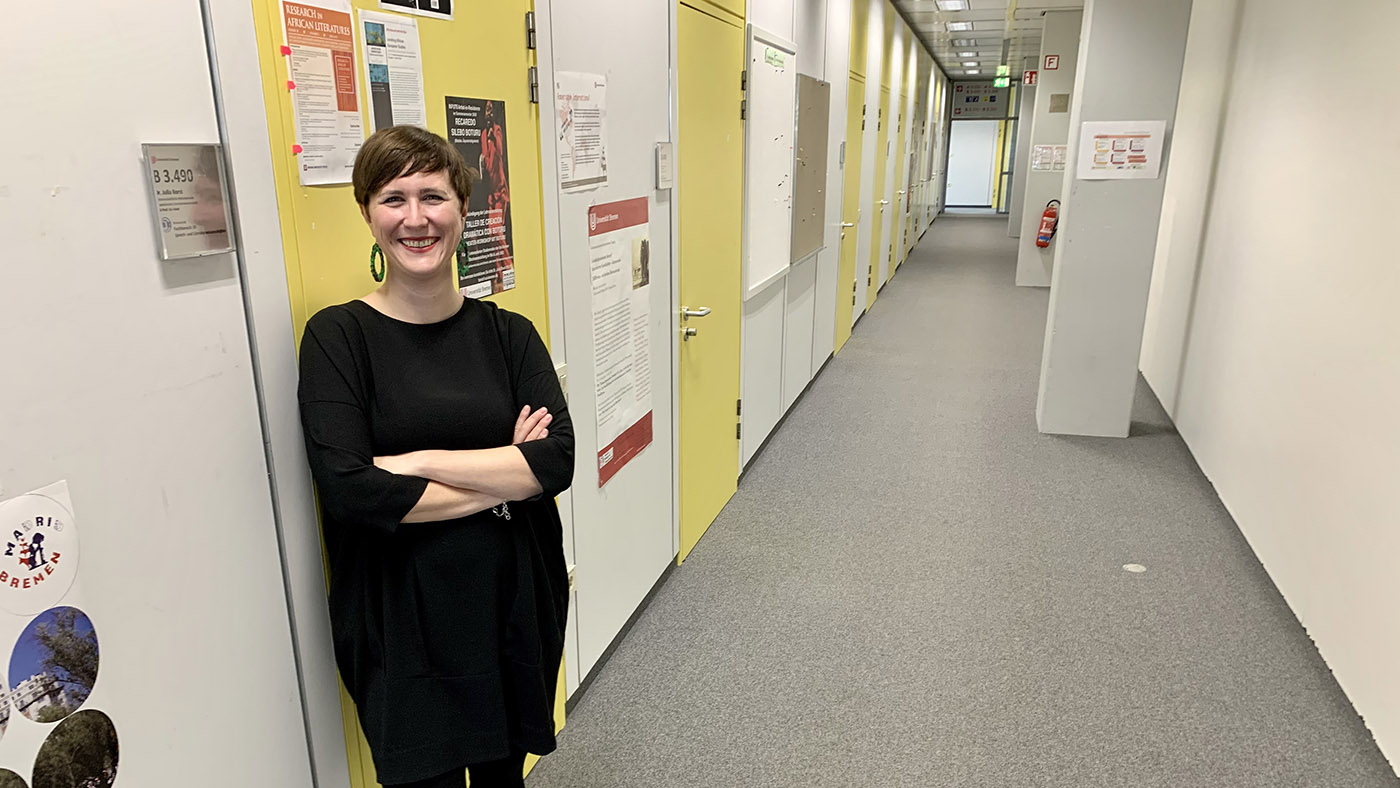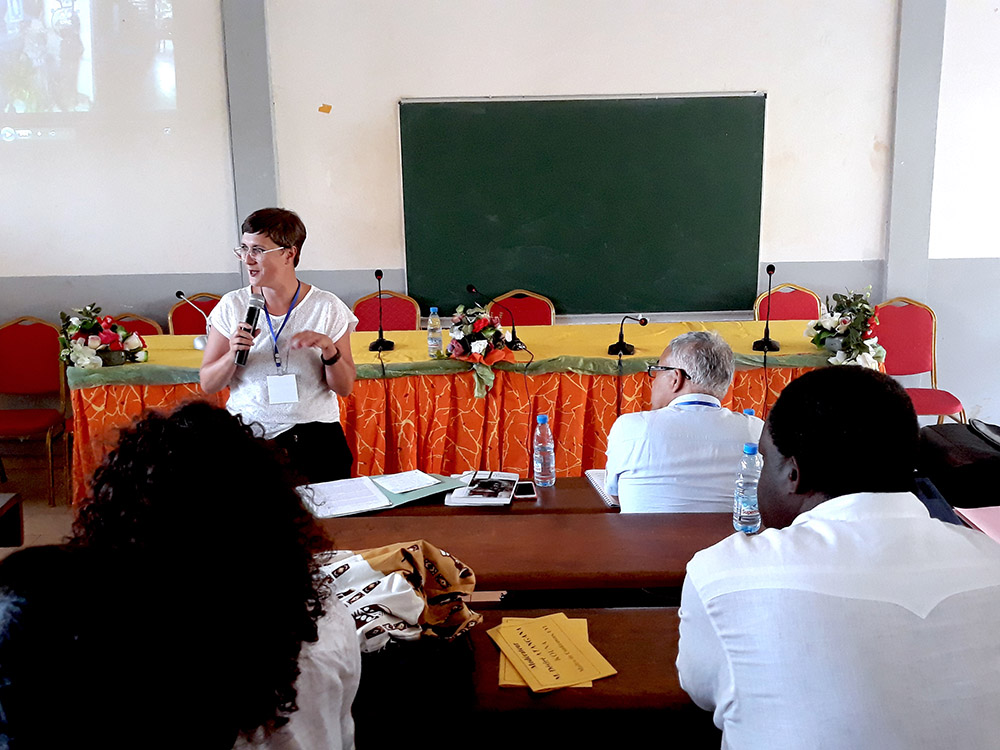
© Julia Borst
“One Should Always Critically View One’s Own Perspectives”
The Heinz Maier Leibnitz Prize winner Julia Borst provides insights into her work and encourages the critical assessment of thought patterns.
In expert circles, Professor Julia Borst is seen as a role model for ethically responsible science. That is one of the reasons why the Romance scholar and literary and cultural studies researcher from the University of Bremen recently received the most significant prize for early-career researchers in Germany – the Heinz Maier Leibnitz Prize. In this interview, Julia Borst tells us how important it is to not only have your head buried in books for literary research.
Ms. Borst, what did you think when you found out that you were to receive the prize?
I found out about the prize when I opened my email inbox after a week’s holiday. The message from the German Research Foundation (DFG) stood out straight away and I had to read it more than once before I believed it. The Heinz Maier Leibnitz Prize truly means a lot to me as the honor validates my previous work and above all my areas of focus in research. As a Romance scholar with a focus on postcolonial studies and contemporary literature, I have sometimes been criticized and asked whether I do not want to do “something traditional.” That is why this prize makes me so happy. It motivates me to continue on the path that I have taken, to continually question the findings and thought patterns, which we employ, and to carry on working on the topics that are close to my heart. Of course, I hope at the same time that the award will also help me in the long run in finding a permanent position at a university. The job situation for the so-called early-career researchers at German universities is often still precarious and more permanent positions that offer researchers like myself more planning security are desperately needed.
Are you able to provide us with a few insights into your research?
I mainly work on French and Spanish contemporary literature. My main focus lies on the field of marginalized literature and cultures outside of and in Europe – thus those that receive little recognition, even from the scientific world. In the frame of my PhD, I, for example, worked on the French-speaking Caribbean and especially Haitian contemporary literature. Haiti is a country that at the beginning of my doctoral studies – and thus before the earthquake in 2010 – was little known by many people. And that was the case even though Haiti had freed itself on its own from French colonial rule and abolished the inhumane practice of enslaving African people at a time when this was still commonplace in many colonies. To be specific, my dissertation was all about the literary presentation of violence and trauma. Amongst other things, the memory triggering function of literature that keeps experiences of violence alive in our collective memory formed the core. But I also critically discussed how from the perspective of a marginalized culture, one-sided stigmatizations can be broken and how societal processes of coming to terms with events can be initiated through literature.
What are you currently working on? Have you got an example?
As part of a current DFG project, I am establishing a relation to the relatively new field of Afro-European studies and am working on African and Afro-descendant authors who write in Spanish. Alongside authors from the former Spanish colony of Equatorial Guinea, this literary field that has hardly been assessed, is comprised of authors from non-Spanish-speaking countries, such as Benin, Senegal, or Cameroon. They took on Spanish as a literary language. This mainly occurred thanks to their own migration experiences. At the same time, works by Spanish people and Spaniards with African roots also belong to this field. The question of the forms in which the above-stated authors address diasporic living environments and identities in the field between homeland and hostland forms the core.

© Julia Borst
What influences the diasporic living environments that are presented in the texts?
Initially, far-reaching ostracism and racism experiences. In addition to that, the authors also write about belonging to plural worlds by means of not only placing their characters in one place or in one culture. At the same time, the texts sketch alternative community concepts and possible axes of solidarization by means of referring to a tradition of African and Afro-diasporic resistance to which the individual can connect. Of course, these topics are not only dealt with in literature, which is why I also include other forms of media, for example films or websites, in my analyses.
In your appraisal as a prizewinner, your dialogue-related and ethically responsible approach to postcolonial issues and topics is acknowledged. What motivates you?
As a European researcher who works on postcolonial constellations and contexts, and in my function as the vice spokesperson for the Institute for Postcolonial and Transcultural Studies (INPUTS) at the University of Bremen, it is important to me that I critically view my own perspectives and network with other worldwide researchers at eye level. Based on this, it is also important to me that I engage in dialogue with the agents in literary and cultural fields, on which my research is based, to include them in conferences and publications, and to give their own perspectives and representations a space.
Was there a key experience for you?
What was significant for me was meeting the Haitian author Lyonel Trouillot when I was in Haiti for the first time in 2009. I not only had many interesting conversations with him but he also consciously confronted me with my own prejudices and the contradictions in Haitian reality. I can remember one day particularly well – I told him that I had been in Cité Soleil together with my city guide, Elie, that morning. That is a district in Haiti’s capital that is characterized by difficult living conditions and considered a particularly dangerous place. Subsequently, Lyonel Trouillot spontaneously invited me to accompany him to a very chic restaurant that same evening in Pétionville, one of the better off districts of Port-au-Prince. His goal was to directly show me the contrasts and contradictions that characterize the country. That is only an example but I always took a great deal away from those personal meetings. Such events repeatedly showed me the significance of not only burying my head in books for literary research but to also getting to know the realities of life.
It is especially in relation to Haiti that I started to more consciously realize that the Western world often arrogantly allows itself to judge other cultures and hold sovereignty in matters of interpretation of other realities, without involving the perspectives of those who are involved. That is why it is important to me that I not only talk about other people but to them and then critically assess my own perspectives based on this.